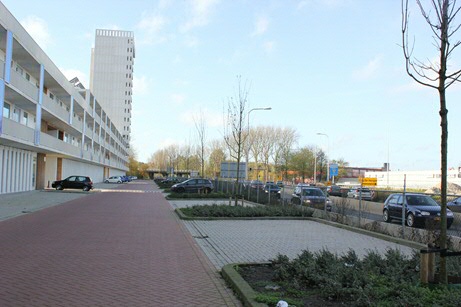Neighbourhood green spaces healthier when easier to access and use

Inhabitants of a neighbourhood with lots of accessible and usable green spaces are more attached to these areas and feel mentally healthier than inhabitants of a neighbourhood with an equal amount of less accessible green space. This is the conclusion of a study conducted by University of Groningen PhD candidate Yang Zhang among 223 inhabitants of the Groningen districts Corpus den Hoorn-Noord and De Hoogte.
There is growing evidence that neighbourhood green spaces have a positive effect on quality of life and on health. However, these effects are not yet fully understood, nor is it clear which specific characteristics of green spaces play a role in this context. By means of a comparative study in neighbourhoods with varying green characteristics, Zhang tried to shed light on these questions. She interviewed inhabitants about their mental and physical health and developed a new scale to map inhabitants’ attachment to the green spaces in their neighbourhood.
A lot of unusable green along the railway track
For her research, Zhang, a PhD candidate at the Department of Planning of the Faculty of Spatial Sciences, selected the districts Corpus den Hoorn-Noord and De Hoogte. The two neighbourhoods have a comparable population and a similar amount of green space, but usability of this green varies between the two. The percentage of green space in both neighbourhoods is approximately 25%. However, in De Hoogte more than half of this is difficult or impossible to access, for example grass verges along the railway track. In Corpus den Hoorn-Noord, on the other hand, only one quarter of the green space is difficult to access or use.

Attachment to green spaces key to health
Zhang observed that inhabitants in the neighbourhood with a lot of accessible green spaces felt above all mentally healthier. She did not find any differences in physical or general health between the inhabitants of the two neighbourhoods. ‘These findings are in line with the results of earlier research. Green spaces seem to mostly impact mental health,’ says Agnes van den Berg, Professor of Perception and Evaluation of Nature and Landscape at the University of Groningen, and supervisor of Zhang’s research. Van den Berg finds it remarkable that a link has now been established between the residents’ mental wellbeing and their sense of connection to green spaces. ‘This suggests that a key factor in the positive health effects of green spaces is people’s attachment to these spaces.’
According to Van den Berg, Zhang’s research offers tools for people to further connect to the green spaces in their neighbourhood. ‘For instance by making sure that green spaces are accessible and fully used. Over time this allows these green spaces to become areas that the inhabitants can relate to emotionally.’
More information
- Contact: Yang Zhang (in English only) or Professor Agnes van den Berg
- Full text: Green Space Attachment and Health: A Comparative Study in Two Urban Neighborhoods
- www.agnesvandenberg.nl
| Last modified: | 04 July 2023 10.37 a.m. |
More news
-
23 April 2024
From battling against the water to living with the water
Margo van den Brink, associate professor of Water and Planning, says that we should adapt our spatial design to the changing climate. This implies difficult choices have to be made because the space is limited and the needs are great.
-
16 April 2024
UG signs Barcelona Declaration on Open Research Information
In a significant stride toward advancing responsible research assessment and open science, the University of Groningen has officially signed the Barcelona Declaration on Open Research Information.
-
16 April 2024
Investors consider region a risk
Investment in real estate appears to be an important explanation for the gap between big cities and the region, argues Michiel Daams, associate professor of Economic Geography of the Real Estate Market. He conducted research on investments in the...
